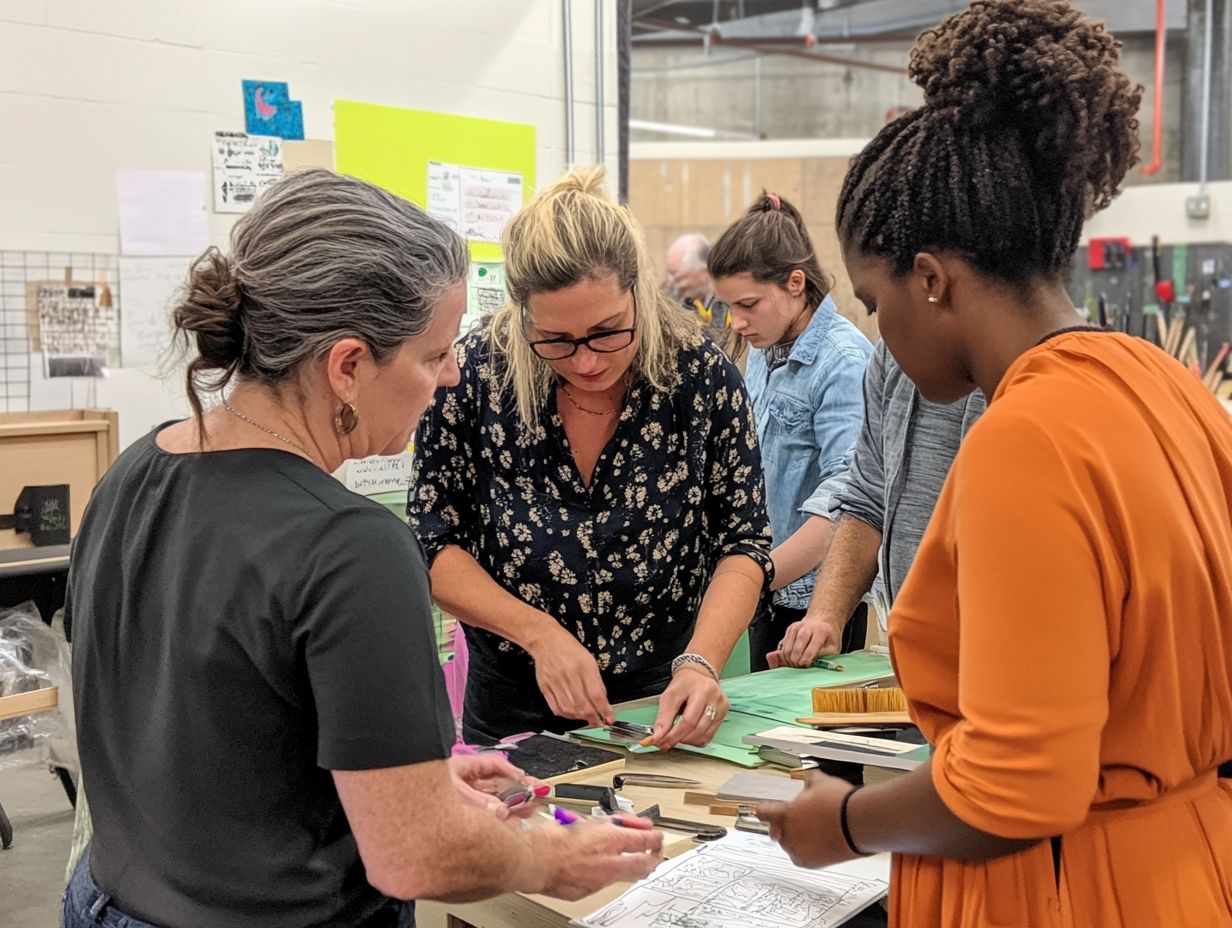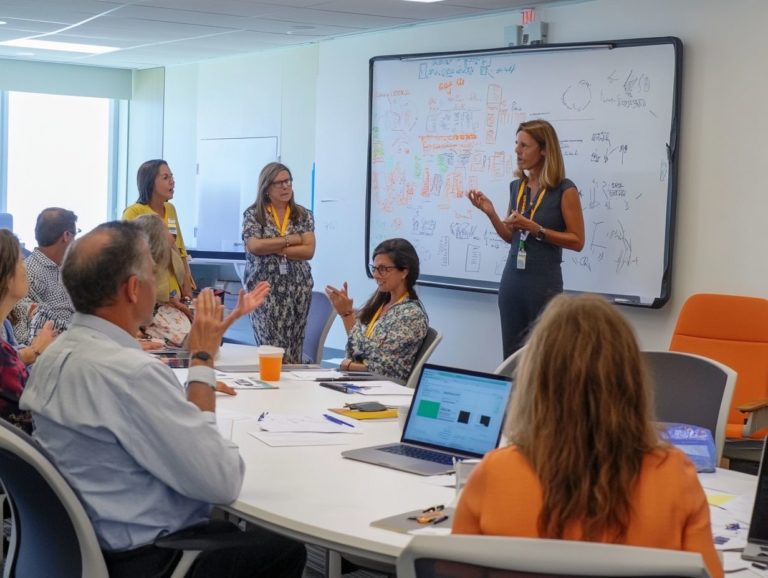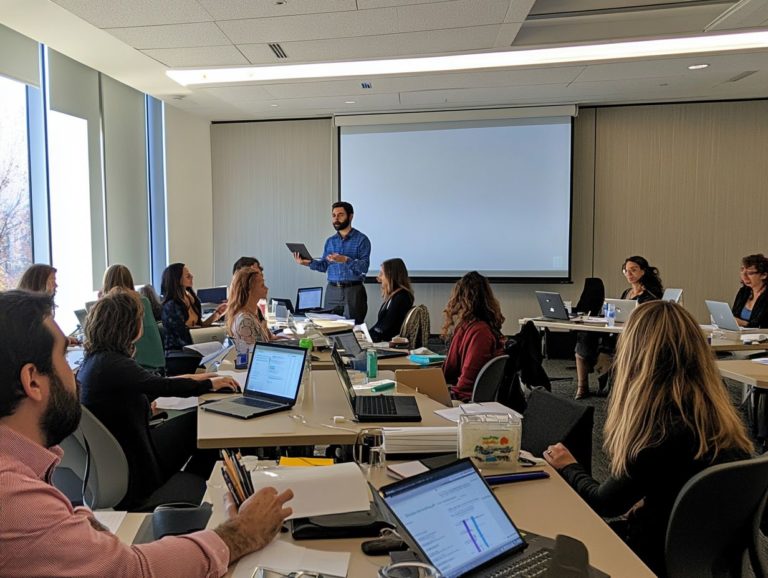Understanding Adult Learning Principles for Skill Enhancement
In today s fast-paced world, continuous skill enhancement is essential for your personal and professional growth.
Effective learning isn t a one-size-fits-all approach; you learn differently than children do. This exploration delves into the fundamental principles of adult learning, contrasting andragogy (the method and practice of teaching adult learners) with pedagogy (the art of teaching children) while emphasizing the significance of self-directed learning, relevance, and active engagement.
By grasping these key concepts, you can elevate your training and development strategies, resulting in improved retention and participation. Discover how applying these principles can profoundly impact your learning journey.
Contents
- Key Takeaways:
- The Importance of Adult Learning Principles
- Key Principles of Adult Learning
- Applying Adult Learning Principles in Practice
- Benefits of Using Adult Learning Principles
- Frequently Asked Questions
- What are adult learning principles and why are they important for skill enhancement?
- What are some common adult learning principles that can be applied for skill enhancement?
- How Understanding Adult Learning Principles Enhances Skill Learning
- How can understanding adult learning principles improve my ability to learn new skills?
- How can I apply adult learning principles in my own learning journey?
- Can adult learning principles be used in any type of skill enhancement?
- Are there any challenges associated with applying adult learning principles?
Key Takeaways:

- Understanding adult learning principles is crucial for skill enhancement as it caters to the unique needs and motivations of adult learners.
- Key principles such as self-directed learning, relevance, and active learning should be incorporated into training and development programs for effective learning.
- Applying adult learning principles can lead to enhanced learning and retention, as well as increased engagement and participation in the learning process.
The Importance of Adult Learning Principles
Understanding adult learning principles is essential for enhancing the skills and competencies of adult learners, as it profoundly impacts the effectiveness of educational institutions and workplace training programs. For a deeper insight, explore understanding the challenges of skill enhancement.
Malcolm Knowles’ concept of andragogy highlights the importance of a learner-centered approach that recognizes the distinct characteristics of adult learners, including their intrinsic motivations and prior experiences.
By embracing these principles, you can create valuable learning experiences that not only foster professional development but also align more closely with your specific learning goals and objectives.
Why Understanding Adult Learning is Essential for Skill Enhancement
Understanding adult learning is vital for enhancing your skills, as it enables educators and trainers to create customized strategies that cater specifically to your unique learning needs.
This insight cultivates a more engaging educational atmosphere and fosters more effective professional development opportunities.
When facilitators truly comprehend how you and other adults learn through experiences and self-reflection they can design programs that resonate deeply with you.
Establishing clear learning objectives is essential; it allows you to concentrate on what s relevant and attainable, encouraging you to take charge of your educational journey.
By promoting self-directed learning, you gain the power to navigate your own learning paths, which makes you more invested and successful in achieving your goals.
Key Principles of Adult Learning
The key principles of adult learning encompass concepts like experiential learning, project-based learning, and the crucial need for immediate applicability of knowledge to real-life situations.
These elements enable you to engage deeply and effectively in your educational journey.
Andragogy vs. Pedagogy
Andragogy stands in stark contrast to pedagogy, highlighting the unique needs and characteristics that adult learners possess.
As an adult learner, you re likely driven by personal or professional goals, bringing a rich tapestry of experience and knowledge to your educational journey. This necessitates a teaching approach that promotes critical thinking and self-direction.
Unlike child learners, who typically benefit from structured guidance and foundational knowledge, you thrive in environments that encourage collaboration and real-world applications, where peer interactions play a vital role.
Employing tailored methods that recognize these differences like problem-based learning and experiential activities becomes essential for your effective engagement. This creates an inspiring environment where you can truly thrive.
Start applying these principles today and watch your skills soar!
Self-Directed Learning

Self-directed learning stands as a cornerstone of adult education, enabling you to take charge of your own educational journey. You have the freedom to set your own goals and tap into a wealth of available resources tailored to your needs.
This approach not only cultivates a profound sense of ownership over your learning experience but also markedly boosts your engagement and retention of knowledge. In this framework, you’re encouraged to delve into a variety of strategies, such as reflective practice and peer collaboration, both of which enrich your educational experience and deepen your understanding.
By actively seeking out and implementing personalized learning techniques, you ll likely notice a surge in your personal drive, translating into enhanced outcomes. This approach leads to continuous learning, equipping you to adapt your skills and knowledge in an ever-evolving world, ultimately fostering your personal and professional growth.
Don t miss out on the benefits of personalized learning techniques!
Relevance and Motivation
The relevance of learning content to your real-life situations significantly boosts your motivation as an adult learner. It s essential for educators to craft training strategies that align with your interests and professional goals.
When educational programs resonate with your daily experiences or workplace challenges, you’ll dive in and engage actively and retain that valuable information. For instance, incorporating role-playing scenarios that mimic real-world problem-solving can enhance your comprehension and application of skills.
Project-based learning is another effective approach, where you can apply new knowledge directly to your tasks, fostering a sense of ownership and accountability. Adding feedback mechanisms, like peer evaluations or real-time assessments, enables you to see the immediate impact of your learning. This bridges the gap between theory and practice, ultimately cultivating a more motivated and dedicated learner in you.
Experience and Prior Knowledge
Recognizing the importance of your prior knowledge and experiences is essential in adult learning, as these elements significantly influence how you engage with new content and participate in learning activities.
By tapping into your unique background, educators can create a more personalized and effective learning environment tailored to your needs. You bring a wealth of experiences from both your personal and professional life, enhancing discussions and providing relatable contexts for new concepts.
Strategies like peer-to-peer knowledge sharing and collaborative projects encourage interaction, allowing you to connect your experiences with the learning objectives. Integrating experiential learning techniques, such as simulations and real-world problem-solving scenarios, can deepen your understanding and retention, ultimately enriching your educational journey.
Active Learning
Active learning stands as a cornerstone of adult education principles, driving your engagement through collaborative activities and dynamic learning techniques.
By embracing strategies like group discussions, role-playing, and hands-on projects, you can create an environment where sharing experiences and insights thrive, enriching the overall learning experience. These approaches build a sense of community among participants and bridge the gap between theoretical concepts and real-world applications.
Through peer feedback and problem-solving tasks, you have the chance to learn from one another, deepening your understanding and retention of the material. This method not only enhances your knowledge acquisition but also cultivates critical thinking and adaptability skills essential tools in today s ever-evolving professional landscape.
Applying Adult Learning Principles in Practice
Applying adult learning principles in practice is essential for delivering effective training and development programs. By embracing these principles, you cultivate a learning culture that not only encourages mentorship opportunities but also promotes solution-oriented learning.
This approach enhances engagement and enables individuals to take charge of their own growth, ultimately leading to more impactful outcomes.
Strategies for Incorporating Adult Learning Principles in Training and Development

Effective training strategies that embrace adult learning principles are vital for meeting your learning objectives and fostering knowledge acquisition among adult learners.
To keep you fully engaged and motivated, it s essential to start by establishing clear and measurable learning objectives that outline what you can expect to gain from the experience.
Instructors should cultivate a learning environment that promotes interaction and collaboration, enabling you to draw from your own experiences while absorbing new concepts.
Using various teaching methods like hands-on activities, discussions, and technology integration greatly enhances your learning experience.
Regular feedback and chances for self-assessment keep you interested and empower you to take charge of your education.
Benefits of Using Adult Learning Principles
Embracing adult learning principles offers a wealth of advantages, such as significantly improved retention of information, heightened engagement, and superior outcomes in both adult education and professional development endeavors.
By applying these principles, you create an enriching environment that fosters growth and success, ensuring that your learning experiences are both impactful and transformative.
Enhanced Learning and Retention
Enhanced learning retention becomes a standout advantage when you apply adult learning principles, as these methods enable you to grasp and retain information more effectively.
By honing in on your unique needs and experiences, these principles create a more engaging and relevant learning environment.
For example, experiential learning means applying your knowledge to real-life situations and has been shown to significantly boost retention rates.
Incorporating collaborative learning strategies allows you to share your perspectives, deepening your understanding even further.
Research demonstrates that when you take an active role in your educational journey, the chances of retaining information skyrocket, highlighting the crucial link between these principles and successful long-term learning outcomes.
Increased Engagement and Participation
Increased engagement and participation among adult learners are transformative outcomes when you apply adult learning principles.
This approach fosters a collaborative learning environment that encourages open dialogue and ample feedback opportunities.
By integrating activities that promote group discussions, peer-to-peer teaching, and project-based learning, you can cultivate a vibrant sense of community among participants.
For example, small group discussions allow learners to share their experiences and insights, enriching their understanding of the subject matter.
Regular feedback whether through informal check-ins or structured assessments is vital; it not only validates learners’ efforts but also steers them toward areas for improvement.
When learners feel their voices are heard and their contributions valued, they are far more likely to stay engaged and invested in their educational journey.
Frequently Asked Questions
What are adult learning principles and why are they important for skill enhancement?

Adult learning principles refer to the theories and methods used to understand how adults learn and retain information. They are important for skill enhancement because they provide a framework for effective and efficient learning methods that cater specifically to adults.
What are some common adult learning principles that can be applied for skill enhancement?
- Self-directed learning
- Relevance
- Practicality
- Past experiences
These principles focus on engaging adults in active learning, making the learning material relatable to their lives, and building upon their existing knowledge and skills.
How Understanding Adult Learning Principles Enhances Skill Learning
How can understanding adult learning principles improve my ability to learn new skills?
Understanding adult learning principles lets you customize your learning approach. This helps you remember information better and stay motivated.
How can I apply adult learning principles in my own learning journey?
Set clear goals and take charge of your learning. Seek out resources that match your interests and get involved with the material actively.
Can adult learning principles be used in any type of skill enhancement?
Absolutely! These principles apply to various skills and learning goals. They work in formal education and informal settings, like picking up a new hobby.
Are there any challenges associated with applying adult learning principles?
One challenge is breaking free from traditional learning methods. Many adults are used to lectures, yet adult learning principles focus on interactive methods.
Though it might require some effort, you’ll see great results!






